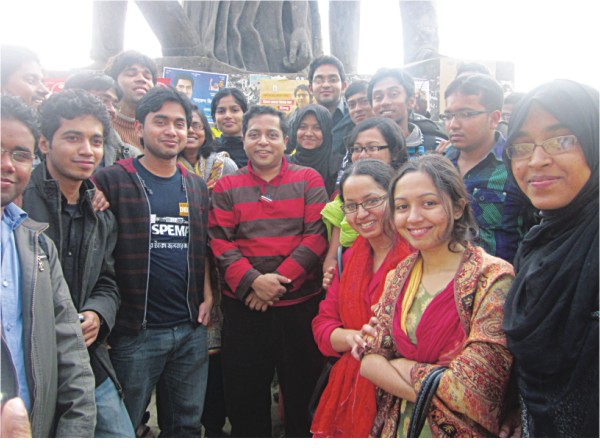Post Campus
A Batch to Remember
Asrar Chowdhury
Almost as a rule, the first course that students of economic theory come across is Microeconomics. This course is also popularly known as Part I of the Principles of Economics. The title originates from the Cambridge Don and one of the 'Founding Fathers' of the Neoclassical School of Economics, Alfred Marshall's Principles of Economics that was the first standard text in economics with a first edition in 1890.
Teaching a foundation course in any discipline is more challenging than it seems. Foundation courses have two objectives. First: to introduce students to a new way of thinking. Second: to help students master tools to analyse intermediate and frontier concepts of their discipline. The Economics Department at Jahangirnagar University offers microeconomics in three parts of its undergraduate programme- in the first year as a Principles of Economics course and in the third and fourth years as an Intermediate Microeconomics course. It was in 2008 that I first got the opportunity to take the Principles of Economics course at Jahangirnagar University with Batch 37 of the department. This was the 2007 HSC Batch. What started off as a first experience turned out to be a unique experience that made me want to meet Batch 37 in the remainder two courses of microeconomics.

Photo: Adnan Shafin Alin
Universities in Bangladesh offer two types of credits in undergraduate programmes. Public universities focus on closed credit where the class size and composition is fixed. The department chooses courses and at which year of their undergraduate students will take them. Private universities focus on open credit where the class is not fixed and students have the freedom to choose when to take their necessary courses. The closed credit system has two vital advantages over the open credit system. A fixed class of students allows students to develop a relationship that the open credit system does not allow. It also allows teachers the scope to know each student personally and identify their strengths and weaknesses.
Economics, Jahangirnagar is one of the few remaining economics departments in Bangladesh that offer annual semesters in their undergraduate programme. The annual semester system has an unmatched advantage over bi and tri semesters. Under the annual semester system, it is possible to give students an initial time to get acquainted with the environment of universities and learn the fundamental tools of a discipline. Although students are screened out through a competitive admission test, different students take different time to understand and master foundational tools of a discipline. Also, a foundation course is crucial because it is here the interest and the enthusiasm towards a discipline or subject makes or breaks. This feature makes annual semesters more attractive since it predominantly allows students the time to settle down and get acquainted with the university and appreciate challenges that lie ahead.
Batch 37 of Economics at Jahangirnagar University with whom I started the Principles of Microeconomics course in March 2008 was an exceptionally good batch. It was one of those experiences in life where one is lucky. The fate was 'written in the stars'. Coming from leading schools and colleges spread throughout Bangladesh, a group of 60 something students assimilated to embark on a journey into the wonderful world of microeconomics. When students are willing to challenge themselves to go beyond the closed and claustrophobic boundaries of the classroom, the teacher and students both enjoy the ultimate pleasure of an education institute. In these rare occasions, education and teaching translates to learning and fun on both sides of the fence.
In the first year with around 60 one hour lectures spread over seven to eight months, it was possible for Batch 37 and myself to visit and numerously re-visit foundation concepts until we were confident we got them right. Learning requires time. An education system has to allow that time to teachers and students to make the best use of an 18-24 year experience that cannot be revisited in life.
When Batch 37 reached their third year, fate was again 'written in the stars'. I was offered to take their Intermediate Microeconomics course. Needless to say the answer was in the affirmative. Again we had another around 60 one hour lectures in the academic year that focused on the consumer, the firm and markets in detail. The third year finished with an introduction to what is in my eyes the most exciting tool in economic theory today since calculus and probability- Game Theory.
Meeting Batch 37 again in the fourth year was in my interest this time. A good and intelligent, but above all intuitive batch encourages the teacher to go all out. Game Theory and Nash equilibrium was the starting point to explain other concepts in the fourth year. If it was not for Batch 37, I may not have had an impetus to cover leading texts that are taught in undergraduate programmes of Ivy League Universities in the USA and at Oxbridge in the UK.
On the last day of the Microeconomics Marathon, after more than 160 one hour lectures spread over three academic years of their undergraduate programme Batch 37, we had an impromptu party. We finished with an assembly in front of the Amar Ekushey sculpture in front of our faculty building. The final moments are frozen in time.
For a rare experience of a Microeconomics Marathon, full credit goes to the other side of the moon- the dark side- the students who are not always credited for showing they too can be an inspiring factor to their teachers. It takes two to dance the Tango and a Waltz. Batch 37 will be one batch of Economics, Jahangirnagar I will fondly remember for a long time.
(The author teaches economic theory at Jahangirnagar University and North South University.)
| 